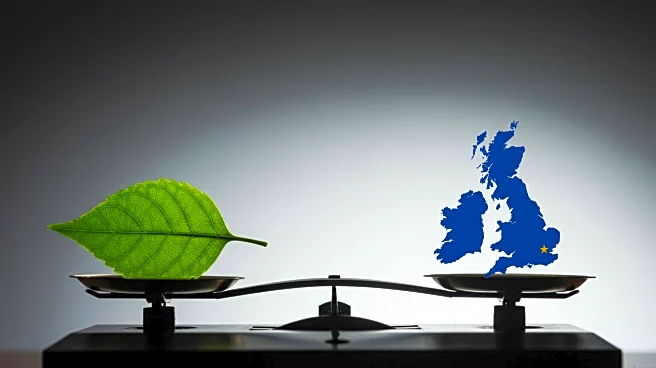What's Happening?
The European Union (EU) has strengthened its environmental protections, while the United Kingdom (UK) has diverged from these regulations following Brexit. The EU has introduced advanced measures such as quaternary water treatment to remove microplastics and dangerous chemicals from waterways, holding polluting companies accountable for these improvements. In contrast, the UK has weakened its environmental laws, including air pollution thresholds and water cleanliness monitoring, and has removed legal duties under the Water Framework Directive. Despite promises from the Labour government to reset relations with the EU and enhance environmental protections, the UK continues to fall behind in safeguarding rare species and cleaning up polluted air and water.
Why It's Important?
The divergence in environmental policies between the EU and the UK has significant implications for public health, biodiversity, and international relations. The EU's stringent regulations aim to protect ecosystems and public health by reducing pollution and safeguarding rare species. The UK's departure from these standards could lead to increased environmental degradation and health risks. Economically, the UK's focus on growth over environmental protection may attract short-term investment but could result in long-term ecological and health costs. The situation highlights the broader impact of Brexit on regulatory alignment and environmental standards.
What's Next?
The UK government faces pressure to address the growing environmental concerns and align more closely with EU standards. Environmental groups and policymakers may push for legislative changes to enhance protections and close existing loopholes. The Labour government, despite its initial promises, may need to reconsider its approach to environmental policy to prevent further divergence and potential backlash from environmentalists and the public. The EU's continued advancements in environmental regulations may serve as a benchmark for the UK to follow, should it choose to prioritize ecological sustainability.
Beyond the Headlines
The weakening of environmental protections in the UK post-Brexit raises ethical questions about the responsibility of governments to safeguard natural resources and public health. The divergence also reflects broader cultural and political shifts, as the UK prioritizes economic growth over environmental sustainability. This situation could lead to long-term shifts in public policy and societal values, emphasizing the need for a balance between development and conservation.










